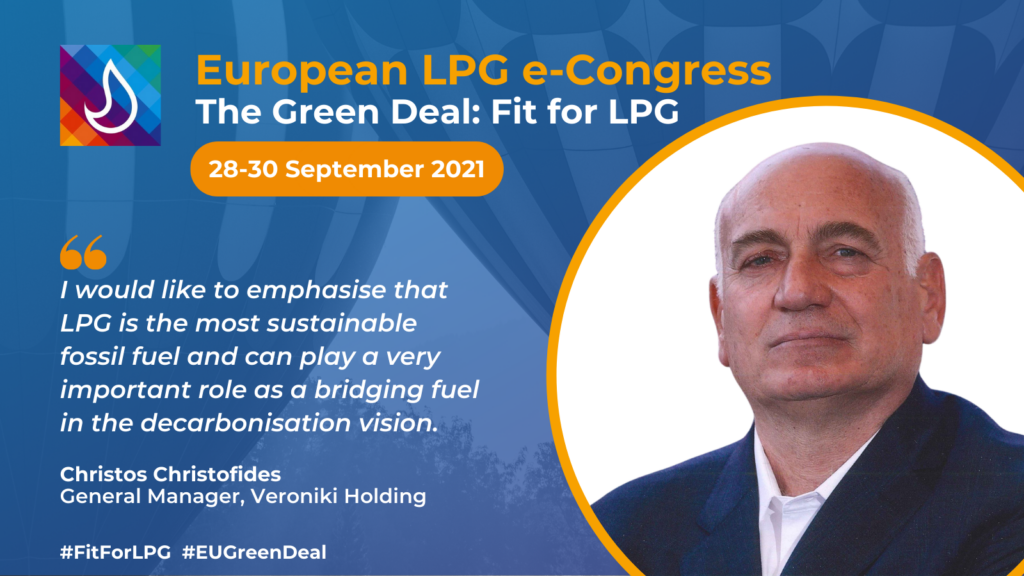The Most Sustainable Fossil Fuel: Why LPG Makes Sense by Christos Christofides
By Christos Christofides | General Manager, Veroniki Holding
I believe that LPG should be considered as the bridge fuel towards the decarbonized energy scenario of 2050. LPG is and will continue to cover an important slice of the energy market over the coming years. Indeed, I think it will play a major role in tackling climate change.
The most interesting fact about LPG is that it is the most sustainable fossil fuel and I hope that in the future it continues replacing other, more polluting liquid and solid fuels.
Because LPG is a by-product of the extraction of natural gas and refining of crude oil, and has cleaner burning properties compering to other fuels, LPG is an ideal sustainable bridge fuel towards the decarbonisation of the energy mix.
There is a lot of confusion about sustainability today, but I am clear about this: LPG is the most sustainable fossil fuel. Why?
- As long as crude oil and natural gas are extracted and processed, LPG will be produced, as a by-product, an associated gas. If not used, it would have been flared in the air.
- The necessary logistic infrastructure is already in place for the further roll out of LPG, so no further investment is required.
- LPG helps to improve air quality, as a viable alternative to traditional fuels that will be progressively phased out because of their high pollutant emissions. This is a fuel characterized by low particle emissions, low NOx emissions and low sulphur content. LPG is an immediately available low carbon alternative to many energy sources. It emits 35% less CO2 than coal and 12% less CO2 than oil.
- LPG contributes to the objective of limiting climate change because it is not a Greenhouse Gas.
- At ambient temperature, if subjected to moderate pressure, LPG changes to a liquid state, which means it is easy to storage and transport and that it can be used everywhere, even in the most isolated rural areas.
- BioLPG is already available on the European market in increasing quantities and is being gradually introduced into the energy mix.
For all these reasons, LPG covers and will continue to cover an important slice of the energy market. As General Manager of Veroniki Holding I truly believe LPG will play a major role in in the future. This means for instance that, in Europe, LPG can help the EU meet its ambitious clean energy targets, as set out in the Fit for 55 Package and 2050 carbon neutrality policies.
As Veroniki Holding we are part of the LPG market in seven European countries, working with ButanGas in Italy, PetroGaz in Greece, DrachenGas in Germany, PropanGas in Austria, ButanGas Romania in Romania, ButanGas International in Serbia, and DragonGaz in Poland.
I expect LPG to remain abundantly available for the foreseeable future. LPG is an energy source people can depend on for years to come.
This month’s European LPG e-Congress is an important moment to reflect on the situation our sector finds itself in today. This includes discussing major issues facing LPG, be it fossil- or bio-based. Interesting ideas can of course emerge from discussions at a conference like this. I hope we can also develop concrete proposals for the political agenda of the coming years.
Above all I would like to repeat that LPG is the most sustainable fossil fuel. My hope is that, together with other alternative gaseous fuels, LPG will gradually replace more polluting liquid and solid fuels.
Christos Christofides is the General Manager of Veroniki Holding and a Member of the Steering Committee of Liquid Gas Europe.
Veroniki Holding S.p.A. was founded in 2010 by Daniela Veronica Gusa de Dragan as the sole coordinating organisation of the Dragan Group. The Group is now present in 9 European countries, where it operates in sectors including LPG.
The European LPG e-Congress will be held on 28, 29 and 30 September 2021, for more details visit www.liquidgaseurope.eu/lge-e-congress
Disclaimer: The views expressed in this article do not necessarily represent the position of Liquid Gas Europe.

